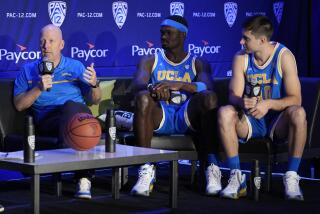Stillson Goes a Long Way to Return to Coaching
- Share via
After a nine-year hiatus, Tony Stillson wanted to return to basketball coaching, a profession he enjoyed for 17 years.
But when he leaves Monday for Lima, Peru, where he will take over the Peruvian national team, he will be forging new territory. And he will so with at least a bit of trepidation.
“I’m excited, but apprehensive,” said Stillson, who is taking a year’s leave of absence from his teaching position at Dana Hills High School. “I know I’ll go through a bit of a cultural shock. It will be a little stressful for the first few weeks or so.”
But this was, after all, what Stillson had in mind when he decided to return to coaching.
During the past nine years Stillson worked as a basketball official after quitting as Dana Hills coach in 1976. He left the business because of health and marital problems, he said.
Stillson had gained most of his recognition at Monrovia High from 1960 and 1972. He won a Southern Section 4-A title in 1967, and was a 4-A finalist in 1970. He guided his teams to eight playoff appearances in 10 years.
In 1969, Stillson took a leave of absence from Monrovia to coach the freshman team at the University of Hawaii, which finished 15-0 in conference.
Yet, the opportunity to coach the Peruvian national team surprised Stillson, 55, who said a former colleague, Jim White, offered him the six-month assignment.
White, the former coach at Harbor College at Wilmington, is a scout for the International Players’ Assn., in charge of finding American players and coaches who can help teams in foreign countries.
“White and I used to work camps together,” Stillson said. “But I hadn’t heard from him for two years. And then I get this call.
“I’ve thought since a couple of years ago of getting back into coaching, but I knew I didn’t want to get back into high school. And this seemed like the right thing at the right time.”
Stillson will receive a car and an apartment in addition to his salary during his stay in Peru, but he still has his doubts because he doesn’t speak Spanish.
“I asked Jim, ‘Hey, how am I gonna talk to them?,’ ” Stillson said. “I don’t speak Spanish.’ And he said if they want to play bad enough, they’ll learn to understand. He tells me I have an assistant who speaks English, so it won’t be that bad . . . I should pick up Spanish real quick.”
Although Stillson, who is divorced, will be living alone in Lima, he has friends nearby. Soon after accepting the job, Stillson discovered a friend of his, Fred Pasquale, is living in Lima. Pasquale, who was formerly a school administrator in Southern California, is currently the main superintendent at the American School of Lima.
“He says they have a beautiful place down there,” Stillson said, “and that I was welcome to stay at their place if mine isn’t ready right away. He told me, ‘you’re gonna love it. The people are great.’ ”
Bringing a winner to Peru, however, won’t be easy.
“I’m going to have to have some patience,” he said. “From what I’m told, I’m going to have to start from scratch. There is no talent at all. But I only know what I’ve heard from Jim, and I don’t know where he got his information from. I hope they (the players) all don’t think I’ll bring instant success, because that’s hard to say. I just hope they accept me for my knowledge and I can get their respect.”
Stillson will have to adjust to rule differences of international play such as the 30-second clock and the regulation international court. He also anticipates a different style of play from what he is accustomed to in the U.S.
“I know it’s a much faster and much rougher game,” he said.
Stillson will find out how much rougher when Peru plays host to two South American championship tournaments this summer. In the past, the Peruvians haven’t fared very well in the tournaments.
“Jim said, ‘If you win the tournaments in July and August, you’re a hero,”’ Stillson joked.
Though he doesn’t expect the team to be very tall, he believes his coaching style will work well within its system.
“I assume we’ll be small and quick,” he said. “But over the years, I’ve always felt I was a defensive coach, and I stressed balance. I emphasized pressure and man-to-man defense. We’ll probably have to press, double up, and trap. I think pressing is the key defensively.”
How long Stillson remains in Lima, he says, depends on his six-month tenure.
“The contract ends in December,” he said, “and then if I like them and they like me, we’ll take it from there.”
More to Read
Get our high school sports newsletter
Prep Rally is devoted to the SoCal high school sports experience, bringing you scores, stories and a behind-the-scenes look at what makes prep sports so popular.
You may occasionally receive promotional content from the Los Angeles Times.






